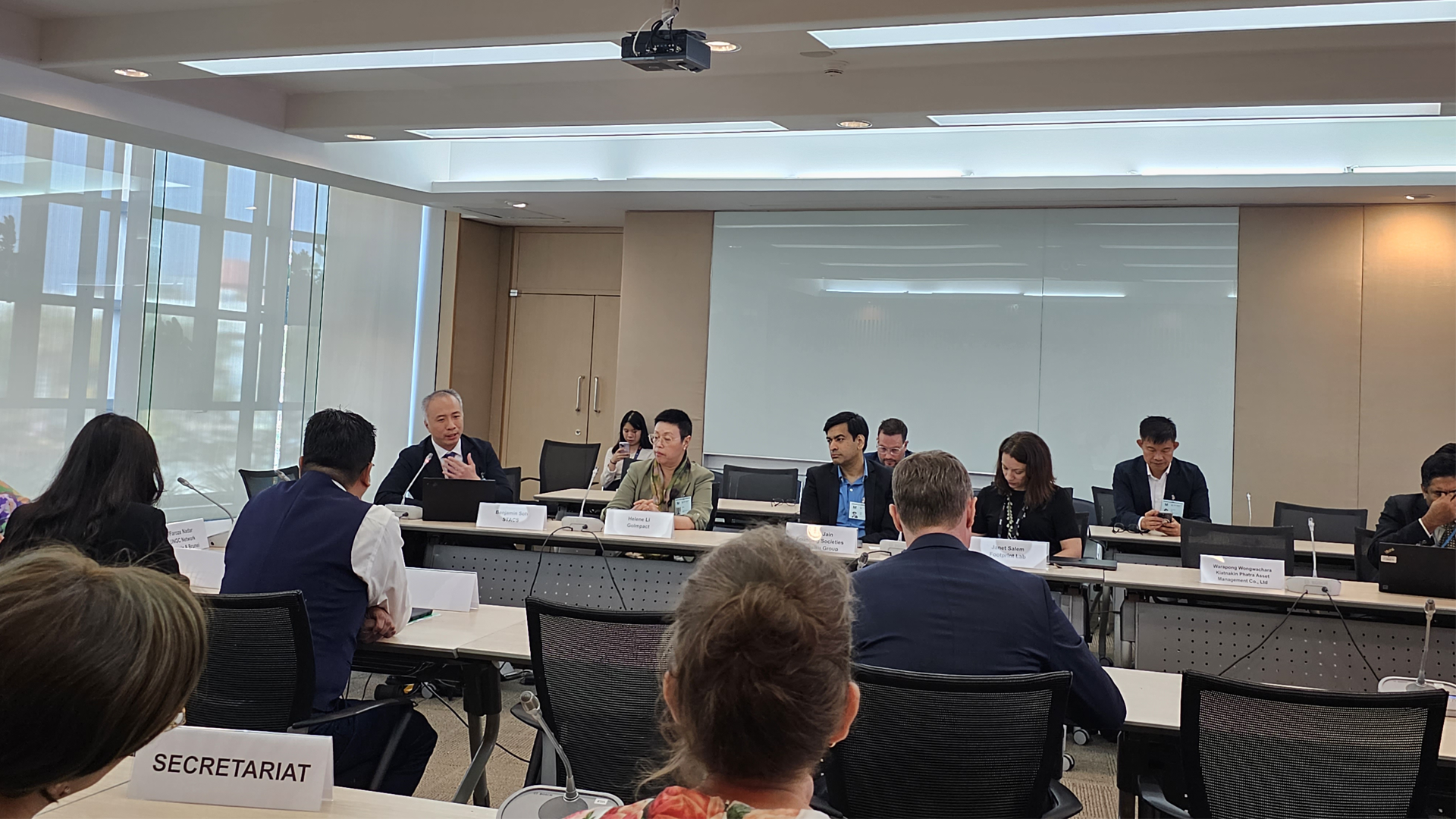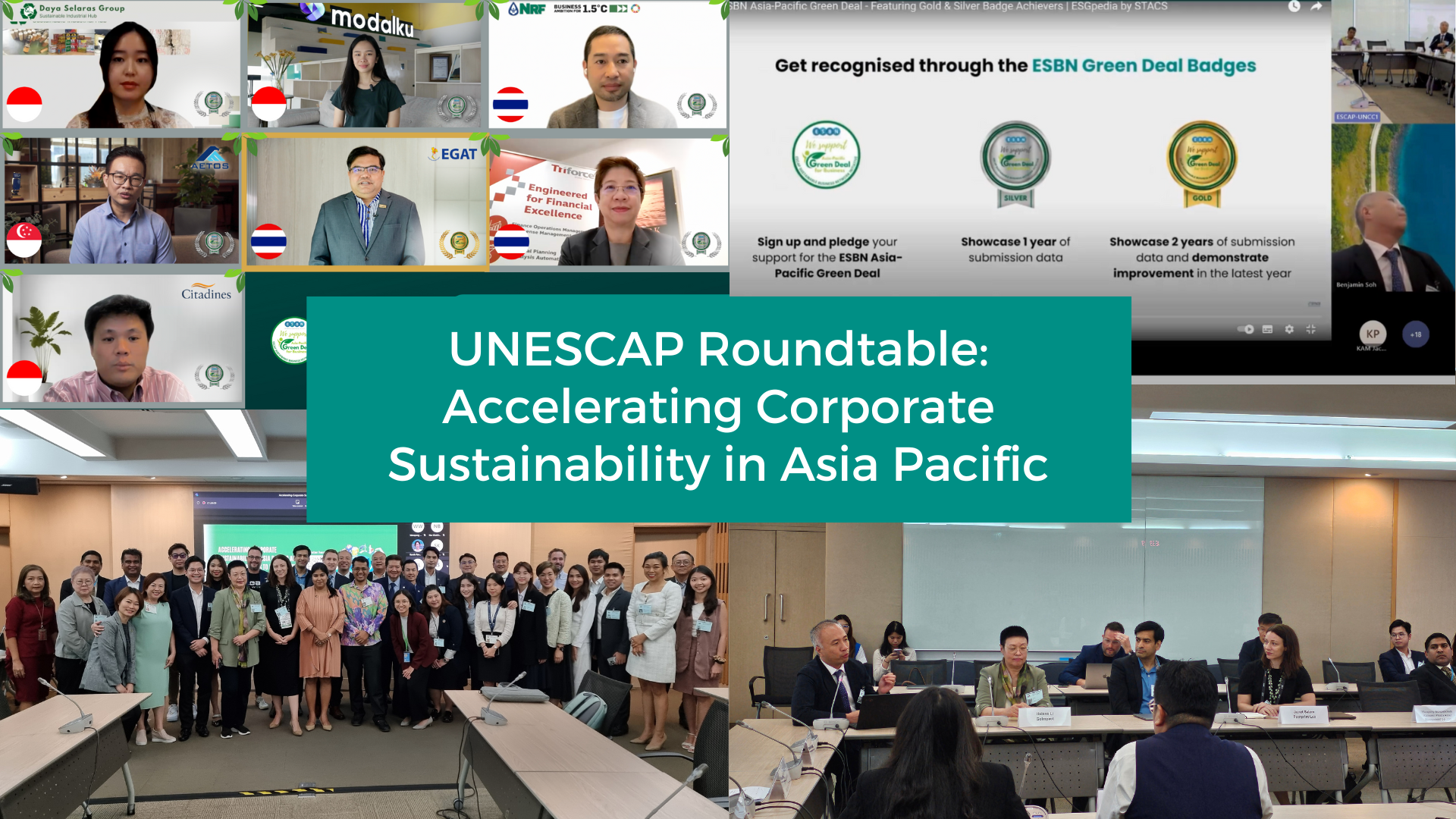Published 9 May 2024 –
In April, STACS was had the deep honour to be invited to lead a segment on the Roundtable session at the 80th Commission of the United Nations ESCAP (UNESCAP), co-organised by ESCAP Sustainability Business Network (ESBN) and the United Nations Global Compact Network Malaysia & Brunei The session centered on the evolving landscape of Environmental, Social, and Governance (ESG) reporting and leading with action, in order to drive supply chains in the region forward, leveraging technology.
As 2024 marks a significant increase in mandatory ESG regulations affecting a broad spectrum of companies, the need for integrated action is more pressing than ever.
This event brought together leading voices from different sectors including government, international organisations, tech, education, and financial services from the Asia-Pacific region. Fellow distinguished roundtable participants such as Electric Generating Authority of Thailand, MFEC, CDL Limited, GoImpact, and more, contributed their expertise and insights around the synergy between sustainability, finance, and technology in a bid to highlight the importance of digital tools in enhancing corporate sustainability efforts – with a special focus on SMEs which constitute 90 per cent of global businesses.
Tools like the UN Global Compact’s self-assessment frameworks have proven vital in boosting the sustainability performance of these smaller enterprises; a year after its launch, the session also revisited the ESBN Asia-Pacific Green Deal programme, showcasing its real-world impacts through STACS’s ESGpedia digital platform.
We are proud that ESGpedia platform has been instrumental in facilitating sustainable financing and greening supply chains across Asia, with quantifiable benefits and real life use cases.
Case studies shared by our Founder & Managing Director, Benjamin Soh, provided tangible examples of its efficacy, making the session a cornerstone event for future UN sustainability dialogues in the region.
Collaborating with United Nations on ESG for Corporate Sustainability

The ESCAP Sustainable Business Network (ESBN), operating under the UN Economic and Social Commission for Asia Pacific (ESCAP), launched an initiative designed to transform the region’s business landscape.
Known as the ESBN Green Deal for Business programme, the effort aims to give businesses the tools, resources, and incentives they need to integrate sustainability into their core operations.
The programme understands that addressing environmental challenges like climate change requires business innovation, and it focuses on helping companies reduce their footprint, foster green growth, and contribute to the UN’s Sustainable Development Goals (SDGs).
To further engage corporates and SMEs to empower them on their sustainability journey, ESBN has partnered with STACS to launch the ESBN Asia-Pacific Green Deal digital assessment on ESGpedia. The free online enabler tool aims to lower the barriers to sustainability for all companies; with no experience or expertise required, businesses can utilise the ESBN Asia-Pacific Green Deal digital assessment to report ESG metrics aligned with international standards, and calculate their GHG emissions, as the first step towards paving their corporate sustainability pathways.
As an official update on real-world results one year on since launching the ESBN Green Deal digital platform on ESGpedia in 2023, the digital platform has enabled more than 300 companies across 18 Asia Pacific countries to take their first steps towards corporate sustainability, with live use cases involving quantifiable financial and business benefits, across Sustainability-linked financing and green supply chain management.
Use case: Enhanced access to sustainability-linked loans
In November 2023, OCBC successfully extended a S$16 million Sustainability Linked Loan (SLL) to global textile and apparel manufacturer, Ghim Li (silver badge achiever), through a fully digitalised and streamlined process on the ESGpedia platform.
The streamlined process involves digital collection of data on ESGpedia via the ESBN Asia-Pacific Green Deal digital assessment, which is then independently verified by global leader in testing, inspection and certification services, Bureau Veritas (an ESGpedia marketplace partner).
Use case: Better management of supply chain sustainability
Companies have utilised ESGpedia to track ESG certifications and data points, as well as ensure that suppliers within their supply chain hold accredited ISO certifications. This helps large corporates monitor the sustainability of their suppliers and ensure that they only procure from suppliers that align with their corporate sustainability requirements.
Suppliers can create their ESG profiles through the ESBN Green Deal for Business platform and amplify it to current and potential stakeholders and customers to prove their commitment to sustainability.
Read more in our co-written blogpost with UNESCAP: https://www.unescap.org/blog/accelerating-sustainability-reporting-asia-and-pacific
Role of Asia Pacific in global supply chain
The Asia Pacific region is a powerhouse of global trade with manufacturing hubs, complex shipping networks, and vast consumer markets cementing it as a central player in the worldwide movement of goods.
However, the environmental and social impact of these extensive supply chains is undeniable. As the sustainability movement gains momentum, Asia Pacific businesses face a unique set of challenges and opportunities to make their supply chains greener.
Companies in the region need to tackle issues like high carbon emissions from transportation, resource depletion, and potential labour rights risks. Yet at the same time, there is immense potential for growing global market share through ESG-driven competition.
ESG regulations have propelled a new trend with over 43% of Asia Pacific CEOs to invest in supply chain sustainability (vs 41% globally) and regional businesses can become more resilient and competitive by preparing their business strategy in advance in order to reduce their Scope 3 emissions.
Investing in clean energy, circular supply chain models, and traceable sourcing practices can not only reduce environmental impact but also make regional businesses more resilient and competitive in a world increasingly focused on sustainability.
It was within this context that digital tools and platforms like ESGpedia play a critical role in aiding businesses in taking steps towards corporate sustainability and decarbonising their supply chains, starting with calculating their environmental impact using comprehensive metrics and standards tailored to Asia Pacific.
ESGpedia accelerates sustainability reporting in Asia Pacific
Free services such as carbon intensity calculations and local emission factors provided by ESGpedia are invaluable in increasingly-mandatory ESG reporting, while also helping businesses qualify for various levels of sustainability badges (i.e. green, silver, gold) which go beyond mere compliance.
The discussion touched on how compliance with sustainability can open doors to better business networks and financial incentives, including but not limited to discounted interest rates for sustainable practices and a competitive edge in the marketplace.
ESGpedia enables enhanced access to sustainability-linked loans and better management of supply chain sustainability via the ESBN Green Deal digital assessment, providing SMEs, corporates, and financial institutions across Asia Pacific with real-time insights into corporate sustainability, streamlining environmental reporting and operations when it comes to metrics like vehicle emissions and energy use.
Its ease of use, efficiency of data management, and improved visibility into sustainable practices as highlighted by partner case studies shared during the session has made us a vital partner to UN-led Net Zero efforts in Asia Pacific.
Benjamin concluded with a reminder to all attendees of the urgent need to address climate change, leaving them with a poignant sense of responsibility as the generation history will judge poorly if our response falls short.





